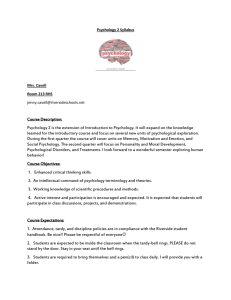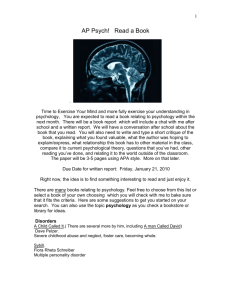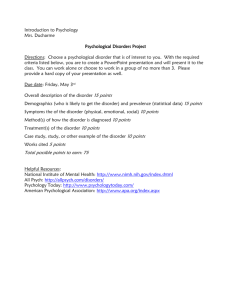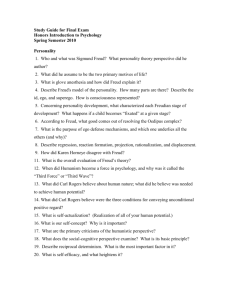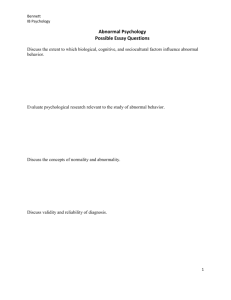flash_card_list - Mr. Voigtschild
advertisement
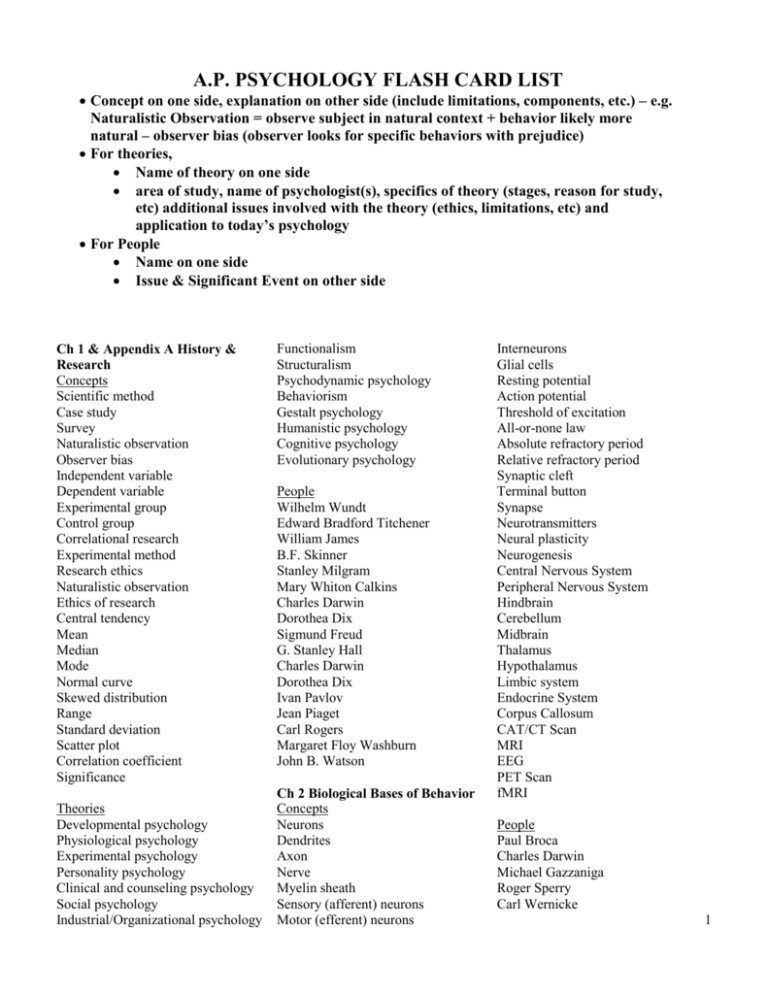
A.P. PSYCHOLOGY FLASH CARD LIST Concept on one side, explanation on other side (include limitations, components, etc.) – e.g. Naturalistic Observation = observe subject in natural context + behavior likely more natural – observer bias (observer looks for specific behaviors with prejudice) For theories, Name of theory on one side area of study, name of psychologist(s), specifics of theory (stages, reason for study, etc) additional issues involved with the theory (ethics, limitations, etc) and application to today’s psychology For People Name on one side Issue & Significant Event on other side Ch 1 & Appendix A History & Research Concepts Scientific method Case study Survey Naturalistic observation Observer bias Independent variable Dependent variable Experimental group Control group Correlational research Experimental method Research ethics Naturalistic observation Ethics of research Central tendency Mean Median Mode Normal curve Skewed distribution Range Standard deviation Scatter plot Correlation coefficient Significance Theories Developmental psychology Physiological psychology Experimental psychology Personality psychology Clinical and counseling psychology Social psychology Industrial/Organizational psychology Functionalism Structuralism Psychodynamic psychology Behaviorism Gestalt psychology Humanistic psychology Cognitive psychology Evolutionary psychology People Wilhelm Wundt Edward Bradford Titchener William James B.F. Skinner Stanley Milgram Mary Whiton Calkins Charles Darwin Dorothea Dix Sigmund Freud G. Stanley Hall Charles Darwin Dorothea Dix Ivan Pavlov Jean Piaget Carl Rogers Margaret Floy Washburn John B. Watson Ch 2 Biological Bases of Behavior Concepts Neurons Dendrites Axon Nerve Myelin sheath Sensory (afferent) neurons Motor (efferent) neurons Interneurons Glial cells Resting potential Action potential Threshold of excitation All-or-none law Absolute refractory period Relative refractory period Synaptic cleft Terminal button Synapse Neurotransmitters Neural plasticity Neurogenesis Central Nervous System Peripheral Nervous System Hindbrain Cerebellum Midbrain Thalamus Hypothalamus Limbic system Endocrine System Corpus Callosum CAT/CT Scan MRI EEG PET Scan fMRI People Paul Broca Charles Darwin Michael Gazzaniga Roger Sperry Carl Wernicke 1 Ch. 3 Sensation & Perception Concepts Sensation Perception Receptor cell Absolute threshold Adaptation Light/Dark Adaptation Just noticeable difference Weber’s Law Subliminal perception Extrasensory perception Telepathy Clairvoyance Precognition Drawing + functions of eye Afterimage Optic nerve Optic chiasm Frequency Pitch Amplitude Drawing + functions of ear Olfactory epithelium Olfactory bulb Pheromones Papillae Kinesthetic senses Vestibular senses Placebo effect Figure-ground Perceptual constancy Monocular cues Binocular cues Retinal disparity Convergence Theories Doctrine of Specific Nerve Energies Gate control theory Biopsychosocial theory Gestalt psychology People Gustav Fechner David Hubel Ernst Weber Torsten Wiesel Ch. 4 Consciousness Concepts Waking consciousness Altered consciousness Circadian rhythms Jet lag Stages 1-4 REM Sleeptalking, sleepwalking and night terrors Insomnia Apnea Narcolepsy Treatment of sleep disorders Manifest content Latent content Psychoactive drugs Depressants (foldable?) Stimulants (foldable?) Hallucinogens (foldable?) Meditation Hypnosis Extinction in C.C. and O.C. Spontaneous Recovery in C.C. and O.C. Stimulus generalization Stimulus discrimination Response generalization Higher-order conditioning Primary reinforcers Secondary reinforcers Contingencies Fixed-interval schedule Fixed-ratio schedule Variable-interval schedule Variable-ratio schedule Latent learning Theories Cognitive map Psychoanalysis explanation of dreams Insight Dreams and Information processing Vicarious learning Dreams and neural activity Theories People Law of effect William James Social learning theory Sigmund Freud Ernest Hilgard People Albert Bandura John Garcia Ch. 5 Learning Concepts Ivan Pavlov Learning Robert Rescorla Conditioning B. F. Skinner Cognitive learning Edward Thorndike Classical conditioning Edward Tolman CS John B. Watson US UR Ch. 6 Memory CR Concepts Desensitization therapy Memory Preparedness Sensory registers Contrapreparedness Attention Taste aversion Short-term memory (STM) (include Operant conditioning capacity) Operant response Chunking Consequence Long-term memory (LTM) (include Reinforcer capacity) Punisher Serial position effect Positive reinforcement Rote rehearsal Negative reinforcement Elaborative rehearsal Punishment Schema Avoidance training Episodic memory Superstitious behavior related to O.C. Semantic memory Learned helplessness Procedural memory Biofeedback Emotional memory Neurofeedback Explicit memory Response acquisition in C.C. Implicit memory Response acquisition in O.C. Tip-of-the-tongue phenomenon Skinner Box Memory storage Shaping Retrograde amnesia 2 Retroactive interference Proactive interference Mnemonics Childhood amnesia Eidetic imagery Flashbulb memory How to reduce forgetting Theories Information-processing model Decay Theory Ch. 7 Cognition & Language Concepts Cognition Language Displacement Phonemes Morphemes Grammar Syntax Semantics Surface structure Deep structure Transformations Concepts Prototype Linguistic determinism Telegraphic speech Steps to problem solving Trial and error Information retrieval Algorithms Heuristics Hill climbing Subgoals Means-end analysis Working backward Mental set Functional fixedness Compensatory model of decision making Confirmation bias Hindsight bias Counterfactual thinking People Noam Chomsky Hermann Ebbinghaus Wolfgang Köhler Elizabeth Loftus George A. Miller Ch 8 Testing and Intelligence Concepts Intelligence Intelligence tests Analytical intelligence Creative intelligence Practical intelligence Binet-Simon scale Stanford-Binet Intelligence scale IQ WAIS-III Group tests Performance tests Culture-fair tests Reliability Split-half reliability Correlation coefficients Validity Mental retardation Giftedness Creativity Theories Triarchic theory Theory of multiple intelligences Emotional intelligence People Alfred Binet Francis Galton Howard Gardner Charles Spearman Robert Sternberg Louis Terman David Wechsler Ch 9 Motivation and Emotion Concepts Instincts Drive Homeostasis Primary drive Secondary drive Yerkes-Dodson Law Incentives Intrinsic motivation Extrinsic motivation Hunger drive Thirst drive Sexual motivation Sexual response cycle Sexual orientation Stimulus motives Aggression Why are people aggressive (different perspectives) Achievement motive Affiliation motive Basic emotions Theories Drive-reduction theory Arousal theory James-Lange theory of emotion Cannon-Bard theory of emotion Cognitive theory of emotion People William James Alfred Kinsey Abraham Maslow Stanley Schachter Hans Selye Ch 10 Life Span Development Concepts Cross-sectional study Cohort Longitudinal study Biographical study Prenatal development Embryo Placenta Teratogens Critical period Fetal Alcohol Syndrome Rooting reflex Sucking reflex Swallowing reflex Stepping reflex Temperament (4 types) Visual cliff Developmental norms Babbling Holophrases Imprinting Attachment Autonomy Socialization Authoritarian Permissive-indifferent Permissive-indulgent Authoritative Solitary play Cooperative play Parallel play Gender identity Gender constancy Imaginary audience Personal fable Identity formation Identity crisis Kubler-Ross’s stages of dying 3 Theories Developmental psychology Piaget’s theory of cognitive development Kohlber’s theory of moral development Language acquisition device People Mary Ainsworth Albert Bandura Diana Baumrind Erik Erikson Sigmund Freud Carol Gilligan Harry Harlow Lawrence Kohlberg Konrad Lorenz Jean Piaget Lev Vygotsky Ch 11 Personality Concepts Id Pleasure principle Ego Superego Reality principle Ego ideal Defense mechanisms (foldable?) Collective unconscious Archetypes Persona and shadow Anima and animus Compensation Inferiority complex Oedipus complex Electra complex Actualizing tendency Unconditional positive regard Conditioned positive regard Expectancies Self-efficacy Locus of control Personal interview Direct observation Objective tests Projective tests Theories Psychodynamic theory Psychoanalysis Humanistic personality theory Trait theory Cognitive-social learning theory People Alfred Adler Albert Bandura Paul Costa Robert McCrae Sigmund Freud Carl Jung Abraham Maslow Carl Rogers Ch 13 Psychological Disorders Concepts Insanity Depression Psychotic Mania Bipolar disorder Cognitive distortions Anxiety disorders Specific phobia Agoraphobia Panic disorder Generalized anxiety disorder Obsessive-compulsive disorder (OCD) Psychosomatic disorder Somatoform disorders Somatization disorder Conversion disorder Hypochondriasis Body dysmorphic disorder Dissociative disorders Dissociative amnesia Dissociative fugue Dissociative identity disorder Depersonalization disorder Sexual dysfunction Erectile disorder or erectile dysfunction (ED) Female sexual arousal disorder Sexual desire disorders Orgasm Orgasmic disorder Premature ejaculation Vaginismus Paraphilias Fetishism Voyeurism Exhibitionism Frotteurism Transvestic fetishism Sexual sadism Sexual masochism Pedophilia Gender-identity disorders Personality disorders Schizoid personality disorder Paranoid personality disorder Dependent personality disorder Avoidant personality disorder Narcissistic personality disorder Borderline personality disorder Antisocial personality disorder Schizophrenic disorders AD/HD Autism Theories Biological model Psychoanalytic model Cognitive-behavioral model Diathesis-stress model Diathesis Systems approach Ch 14 Therapies Concepts Psychotherapy Insight therapies Free association Transference Insight Client-centered (or person centered) therapy Gestalt therapy Short-term psychodynamic psychotherapy Behavior therapies Systematic desensitization Aversive conditioning Behavior contracting Token economy Modeling Cognitive therapies Stress-inoculation therapy Rational-emotive therapy (RET) Cognitive therapy Group therapy Family therapy Couple therapy Eclecticism Antipsychotic drugs Biological treatments Electroconvulsive therapy (ECT) Psychosurgery Deinstitutionalization Prevention Primary prevention Secondary prevention Tertiary prevention 4 People Aaron Beck Albert Ellis, Sigmund Freud Mary Cover Jones Carl Rogers B. F. Skinner Joseph Wolpe Ch 15 Social Psychology Concepts Social psychology Primary effect Self-fulfilling prophecy Stereotype Fundamental attribution error Defensive attribution Just-word hypothesis Proximity Exchange Intimacy Attitude Self-monitoring Prejudice Discrimination Frustration-aggression theory Authoritarian personality Racism Cognitive dissonance Social influence Cultural truisms Norm Conformity Compliance Obedience Deindividuation Altruistic behavior Bystander affect Risky shift Polarization Social loafing Industrial/organization (I/O) Psychology Hawthorne effect Theories Great person theory Attribution theory People Solomon Asch Leon Festinger Stanley Milgram Philip Zimbardo 5
